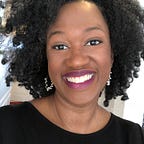Owning Where I Stand: Building Treatments for Obesity and Eating Disorders for Black Women
I design treatments for eating disorders and obesity. Intersectionality matters.
I start this conversation from a different place than most who have been known in these fields.
I am a Black woman.
I currently have a weight that would classify me as obese.
I am a clinical social worker with practice experience in the treatment of disordered eating in predominately African American communities.
I practice the Christian faith.
And finally, I am a researcher who conducts studies to help Black women reduce binge and overeating.
Intersectionality matters.
It is from this place that I enter the discussion about eating behaviors and weight. As a Black woman, I know what I see. I have grown up watching my community have our unique relationship with food and weight. In many ways, we were the originators of body positivity. Black woman have been self-defining; we’ve had to be. We are known to create mosaics of beauty with hair and clothes, carrying about a body that is sized differently than the norm. We have more flexibility, with a willingness to accept that size diversity exists, and it is the soul of the woman that matters.
I also know what I hear. Stories. Lots of stories. Stories of women who have spent their years caring for others, only to have the years of self-neglect and poor eating manifest in a disease that requires attention. Indeed, I have seen the inverse and the inevitable consequence of this stance: sickness. Black women carry the highest rates of obesity and heart disease in the nation. Black Americans are plagued with rising rates of type 2 diabetes, and have the highest diabetes-related mortality in the nation. I see the older women in my research studies, who after many years of managing life in this wretched and racist country, are carrying diseases that are taking their life away.
I also can’t help but consider my story and what I remember. I was diagnosed with polycystic ovary syndrome when I was nearly 20, after many years of rapid weight gain that had also negatively impacted my ability to ovulate regularly, and threatened my future of childbearing. I was told that losing some weight would be helpful. Receiving that advice in the height of the diet era began my journey down the ill-fated road of diet chasing, running toward the next strategy that promises to be the answer to my toiled relationship with food.
Moreover, I, too, have had my experience with disordered eating. I remember feeling afraid to eat after enjoying a bit of weight loss after dieting. I remember wondering if anyone could ever help me not feel like a slave to food. I remember laughing with friends about how we wish we could be disciplined to restrict our eating, using our laughter to hide the utter sadness of feeling like we were trapped by this weight that would not budge. I remember watching friends have romantic relationships from the sidelines. For many years. There are some things you can’t speak on unless you intimately know. I know the pain of carrying excess weight.
I also remember how my life changed when I found hope in my faith and relationship with God to transform my relationship with food. To not lean on it to meet needs that it cannot meet. To decide to honor my body’s signals of hunger and satiety, knowing to took courage to both start eating and to stop after my complicated years of dieting. And to also see my life transform. It is from this place that I finally learned what it meant to feel free around food, and how to make choices to keep me there.
Intersectionality and context are important.
So, it is from this place that I declare that I am a researcher studying both eating disorders and obesity. Yes, both. As long as Black women continue to be entrapped by sickness from chronic disease and are using food to cope with negative emotions and food, I see the need to be in both places.
Though I understand the pain that weight stigma has caused, for women in my community, the pain of sickness and stolen years of life scream louder. Though we may not have good examples of how to use a non-dieting approach to weight loss, that doesn’t bother me. I am a researcher. I build things that don’t exist yet.
What I have seen, hear, and remember let me know this:
What we eat matters.
Why we eat matters.
What we weigh matters.
These things are not neutral. And though the stories are varied, and the reasons are complex, the answer still deserves attention. I will persist.
